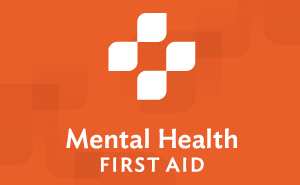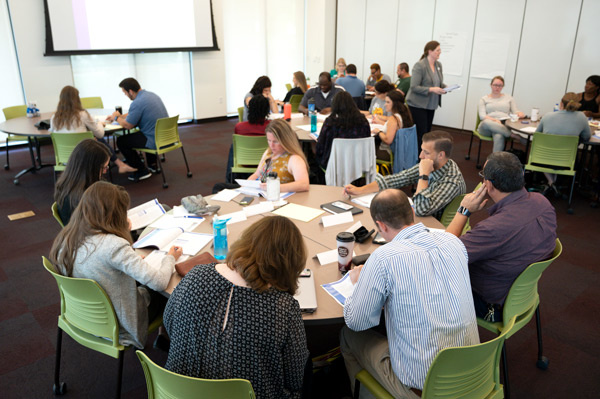Mental Health First Aid Training Key to Helping Others
Saint Leo University will offer the 8-hour course in the fall to provide skills to assist those in crisis.

Saint Leo University will offer the 8-hour course in the fall to provide skills to assist those in crisis.

 When people think about "being healthy," they often forget that mental health is part of that. Good mental health plays a role in maintaining good physical health—and vice versa.
When people think about "being healthy," they often forget that mental health is part of that. Good mental health plays a role in maintaining good physical health—and vice versa.
"Mental health affects the entire well-being of a person, through all stages of a person's life," said Dr. Nancy Wood, director of Saint Leo University's Graduate Human Services Administration Program. "Mental health is equally important as physical health, and should be given the same attention."
Wood teaches Mental Health First Aid (MHFA) courses, which Saint Leo University has offered several times to community members and some staff.
"In the past, MHFA trainings have been provided to staff, students, and the general public, as an opportunity to help their communities at work, home, church, school, and other places," Wood said.
It's in keeping with Saint Leo University's core values to offer this training to the public and to employees and students. Among those core values are "respect" and "community," and the MHFA training reinforces the idea that everyone should be treated with dignity.
Mental Health First Aid is a skills-based training course that teaches participants about mental health and substance-use issues. The course uses role-playing and simulation to demonstrate how to offer initial help in a mental health crisis and connect people to the appropriate professional, peer, social, and self-help care.
.jpg) Just like CPR training, Mental Health First Aid prepares participants to interact with a person in crisis and connect the person with assistance.
Just like CPR training, Mental Health First Aid prepares participants to interact with a person in crisis and connect the person with assistance.
"The training gives you the skills you need to reach out and provide initial help and support to someone who may be developing a mental health or substance use problem or experiencing a crisis," according to the National Council for Mental Wellbeing and MHFA. "Mental Health First Aid courses are for anyone who wants to make their community healthier, happier, and safer for all."
The program also teaches the common risk factors and warning signs of illnesses such as anxiety, depression, substance use, bipolar disorder, eating disorders, and schizophrenia.
Saint Leo offers the 8-hour Mental Health First Aid course to teach others how to help those experiencing mental health or drug and alcohol issues. Research shows those trained in MHFA are more confident in providing help to others, Wood said, and they have a greater likelihood of advising those people to seek profession help. Those who are trained in MHFA also are shown to have greater agreement with health professionals about treatments.
There are two types of Mental Health First Aid training:
 In the fall, Saint Leo will offer MHFA training at University Campus and at select education center locations.
In the fall, Saint Leo will offer MHFA training at University Campus and at select education center locations.
Mental Health First Aid is taught to a variety of audiences, including health, human services and social workers; employers and business leaders; first responders; faith community leaders; college and university staff and faculty; law enforcement and public safety officials; military members, veterans and family members; people with mental illness and addiction and their families; and other caring citizens.
For those in the human services field, Wood said they will find the training helpful or, "find the training a wonderful refresher."
Mental health awareness also plays a role in the curriculum at Saint Leo University. The university's new College of Health Professions and its Bachelor of Science in nursing degree program also will take a universal look at medical care. The new college will focus on care that embodies holistic wellness for the individual and the community.
While it is important for medical professionals to provide medical care to others, they also must focus on themselves and be aware of the role stress can play in their own mental and physical health.
May, as National Mental Health Awareness Month, is dedicated to providing support, removing stigmas, and educating others. Why is it important to be prepared to deal with these issues?
"As stated by the Mental Health American [MHA], 'we are seeing the highest levels of anxiety and depression reported since the [COVID-19] pandemic hit the U.S. in March,'" Wood said.
The National Alliance on Mental Illness states millions of people are affected by mental health conditions each year. NAMI provides these statistics:
Saint Leo University focuses on the mind, body, and soul, with a commitment to nourishing each of these areas so providing Mental Health First Aid courses fits the university's mission.
"Every person must recognize the importance of his or her own mental, physical, and emotional health and practicing self-care," Wood advised. "By taking care of yourself, you can be at your best to help and care for others."
More information when Mental Health First Aid training will be offered at Saint Leo University will be shared closed to the Fall 2021 Semester. For more information about the Graduate Human Services Administration Program and the Mental Health First Aid training, email nancy.wood@saintleo.edu. For more information about the College of Health Professions or the Bachelor of Science in nursing, view https://www.saintleo.edu/health-professions-degree.